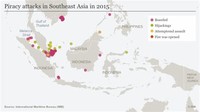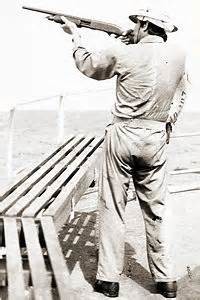Facts about Piracy

A wartime activity similar to piracy involves disguised warships called commerce raiders or merchant raiders, which attacked enemy shipping commerce, approaching by stealth and then opening fire.

The effects that large-scale piracy had on the Chinese economy were immense.

Despite the best efforts of naval and merchant seamen to resist piracy, in areas where there is lawlessness or serious economic deprivation piracy will be found.

Piracy in Southeast Asia began with the retreating Mongol Yuan fleet after the betrayal by their Sri Vijayan allies in the war with Majapahit.

The classical age of piracy coexisted with a rise in English imperialism, which required merchant vessels to transport goods and warships to protect the trade ships from pirates and privateers.

The great or classic era of piracy in the Caribbean extends from around 1560 up until the mid-1760s.

Small ships are also capable of disguising themselves as fishing vessels or cargo vessels when not carrying out piracy in order to avoid or deceive inspectors.

The earliest documented incidence of piracy is the exploits of the Sea Peoples who threatened the Aegean civilization in the thirteenth century B.C.E.

The occurrence of piracy was closely related to international trade, as those involved in piracy would have experience of sailing the trade routes.

Caribbean piracy arose out of, and mirrored on a smaller scale, the conflicts over trade and colonization among the rival European powers of the time, including England, Spain, Dutch United Provinces, and France.

The Senate finally invested Pompey with special powers to deal with piracy in 67 B.C.E.

Pirates from Africa raided the Spanish coast on behalf of the Ottoman Empire during the sixteenth century until the Battle of Lepanto, in which the Ottomans were defeated and withdrew efforts of piracy.

An example is the hijacking of the Italian civilian passenger ship Achille Lauro, which is generally regarded as an act of piracy.

The letter of marque was recognized by international convention and meant that a privateer could not technically be charged with piracy while attacking the targets named in his commission.

The crime of piracy is considered a breach of jus cogens, a conventional peremptory international norm that states must uphold.

Piracy is of note in international law as it is commonly held to represent the earliest invocation of the concept of universal jurisdiction.

In 1802, the menacing Zheng Yi inherited the fleet of his cousin, Captain Zheng Qi, whose death provided Zheng Yi with considerably more influence in the world of piracy.

Piracy is a robbery committed at sea, or outside the normal jurisdiction of any state, by an agent without a commission from a sovereign nation.

Despite signing a treaty with Venice, the "Narentines," as they were called, soon broke it and continued their piracy for centuries.



